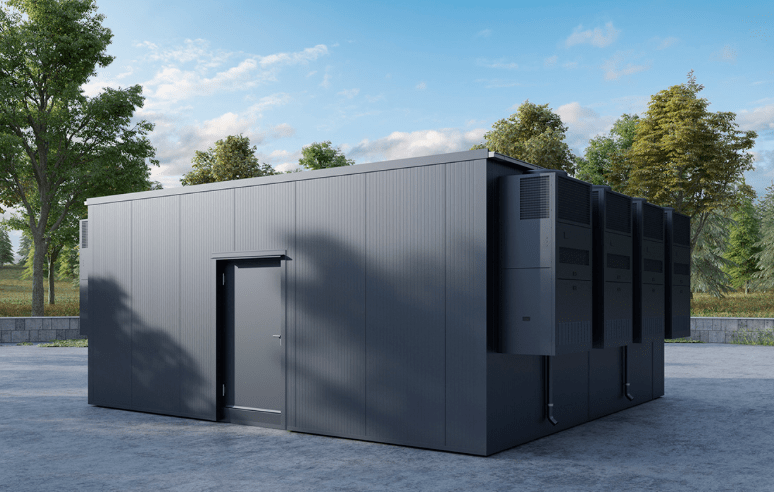Digitalisation and edge computing are growing trends. The micro data centre plays a key role in this development.
- Scalability: Always the ideal size to meet individual requirements.
- Efficiency: Data processing directly at the source.
- Price/Performance: High-end data processing at affordable prices.
- Buying or renting? Cadolto Datacenter offers you both options.

A micro data centre is basically a small and self-contained data centre. It brings together all of the core functions of bigger centres in one compact unit. Servers, storage, cooling, a UPS and networking are all included.
What is the difference to a conventional data centre?
Other differences to central data centers?
Micro data centre
Size
Small, often just one module or a few racks
Location
In the vicinity of data sources or applications
Scalability
Modular, easy to extend
Purchasing costs
Usually lower
Operating costs
Often lower, especially for smaller applications
Conventional data centre
Size
Large, several rooms or even an entire building
Location
Centralised locations, far away from data sources
Scalability
Often more difficult and expensive to extend
Purchasing costs
Higher, requires greater investments
Operating costs
Usually higher
 Contact
Contact We understand that the decision for a micro data center requires extensive consultation. Enter your details in the contact form and we will call you back within 24 hours, advise you and convince you of the benefits.

Main advantages for users
- Micro data centres differ greatly from traditional ones. Where central data centres face disadvantages, micro data centres strike a chord with users. The following advantages are available to every user:
- Flexible positioning: What a micro data centre lacks in size it more than makes up for in terms of performance. Its compact structure and more or less plug-and-play features mean it can be located precisely where data needs to be processed.
- Improved performance: Close positioning to the data source reduces latency and improves the speed and quality of data processing.
- Energy-efficient cooling: The micro data centres from Cadolto Datacenter GmbH have been designed for maximum energy efficiency thanks to the building’s intelligent use of space combined with air conditioning and other tailored components.
- Immediate commissioning: Moreover, the micro data centres from Cadolto Datacenter are pre-assembled with best-practice components and delivered IT ready. This ensures they meet the requirements of customers exactly.
- Extendable at any time: Scalability is yet another advantage of micro data centres. Depending on requirements, additional units can be added or taken away. This means that the IT infrastructure can be adapted to suit changing requirements without the need for huge investment in new data centre buildings.
Micro data centres are ideal for edge computing scenarios, processing data at source. In locations where conventional data centres are uneconomical or impractical, the mini data centre is the ideal alternative. Examples include urban settings, industrial operations and remote locations.
A micro data centre is a small data centre that can be flexibly scaled to the required computing power. Due to its ideal size, resources can be used effectively. The MDC is thus energy efficient, powerful and lower in price to maintain.
Thanks to its modular design, a micro data centre can be extended with ease. This is also possible during ongoing operation of the previously installed modules. Since all the modules are separate from each other, they can continue to run without any restrictions even when an additional module is added.
Data centres are usually entire buildings that act only as a “home” for servers and other computer hardware. A server room is significantly smaller. It is often limited to a single room inside a building that delivers a fraction of the computing power of a data centre.
Edge computing requires decentralised data management. Micro data centres can be easily set up at various locations to deliver the required on-premise computing power. By networking with other modules, the decentralised network required for edge computing can be established.
To reduce latency and enable faster responsiveness, edge computing moves data processing closer to the data source or end user. Cloud computing, on the other hand, centralises data processing in remote data centres. Although this facilitates resource management, it is often associated with significantly higher latency.
